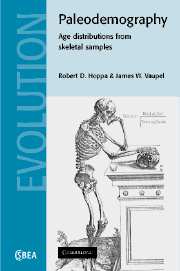Book contents
- Frontmatter
- Contents
- List of contributors
- Acknowledgments
- 1 The Rostock Manifesto for paleodemography: the way from stage to age
- 2 Paleodemography: looking back and thinking ahead
- 3 Reference samples: the first step in linking biology and age in the human skeleton
- 4 Aging through the ages: historical perspectives on age indicator methods
- 5 Transition analysis: a new method for estimating age from skeletons
- 6 Age estimation by tooth cementum annulation: perspectives of a new validation study
- 7 Mortality models for paleodemography
- 8 Linking age-at-death distributions and ancient population dynamics: a case study
- 9 A solution to the problem of obtaining a mortality schedule for paleodemographic data
- 10 Estimating age-at-death distributions from skeletal samples: a multivariate latent-trait approach
- 11 Markov chain Monte Carlo estimation of hazard model parameters in paleodemography
- 12 A re-examination of the age-at-death distribution of Indian Knoll
- Index
11 - Markov chain Monte Carlo estimation of hazard model parameters in paleodemography
Published online by Cambridge University Press: 28 August 2009
- Frontmatter
- Contents
- List of contributors
- Acknowledgments
- 1 The Rostock Manifesto for paleodemography: the way from stage to age
- 2 Paleodemography: looking back and thinking ahead
- 3 Reference samples: the first step in linking biology and age in the human skeleton
- 4 Aging through the ages: historical perspectives on age indicator methods
- 5 Transition analysis: a new method for estimating age from skeletons
- 6 Age estimation by tooth cementum annulation: perspectives of a new validation study
- 7 Mortality models for paleodemography
- 8 Linking age-at-death distributions and ancient population dynamics: a case study
- 9 A solution to the problem of obtaining a mortality schedule for paleodemographic data
- 10 Estimating age-at-death distributions from skeletal samples: a multivariate latent-trait approach
- 11 Markov chain Monte Carlo estimation of hazard model parameters in paleodemography
- 12 A re-examination of the age-at-death distribution of Indian Knoll
- Index
Summary
Introduction
In the early 1990s Konigsberg and Frankenberg wrote “A future direction that we expect to see in anthropological demography and paleodemography is the incorporation of uncertainty of age estimates into reduced parameterizations of life table functions. For example, hazards analysis, which reduces the mortality parameters to a small set, has recently been used in a number of anthropological demography studies” (Konigsberg and Frankenberg 1992:252). At the time we were writing we lacked the appropriate reference sample data for such an endeavor, as well as a number of the requisite statistical/computational tools. Today, neither of these issues is particularly problematical. Consequently, in this chapter we present some newer methods exploiting available reference sample data. The structure of this chapter is as follows. First, we discuss methods for modeling the dependence of an ordinal categorical variable on age. We then discuss the modeling of survivorship for archaeological human remains, and show how hazard model parameters can be estimated from an ordinal categorical variable using traditional maximization of the loglikelihood. We follow this presentation of methods with a brief example of estimating the parameters in a Gompertz–Makeham model using pubic symphyseal data and the method of maximum likelihood. We then turn to using a specific Markov chain Monte Carlo (MCMC) method known as the Gibbs Sampler to show how more general problems in hazard model and age estimation can be attacked.
- Type
- Chapter
- Information
- PaleodemographyAge Distributions from Skeletal Samples, pp. 222 - 242Publisher: Cambridge University PressPrint publication year: 2002
- 26
- Cited by

